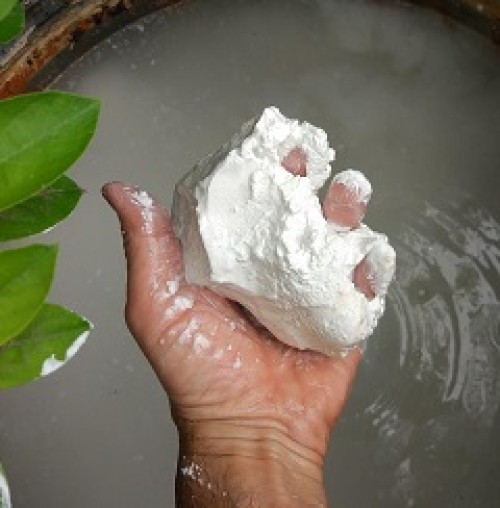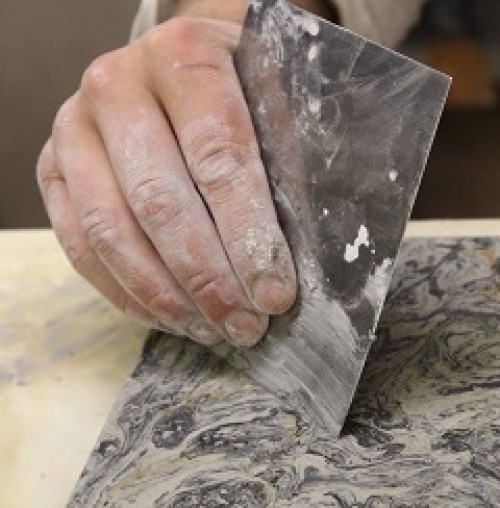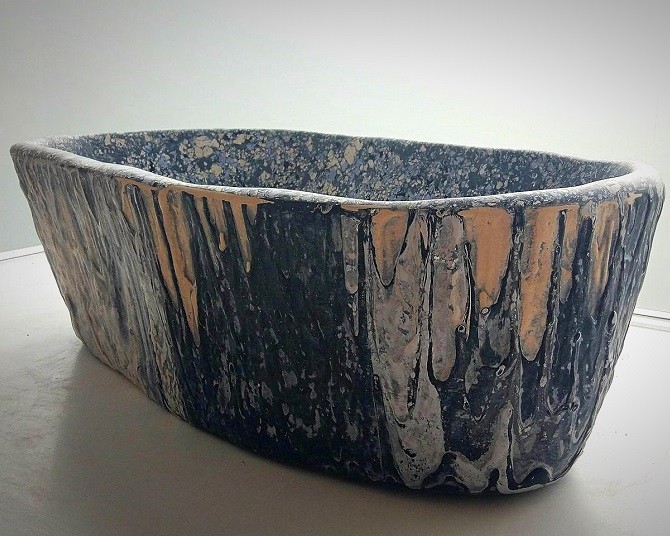
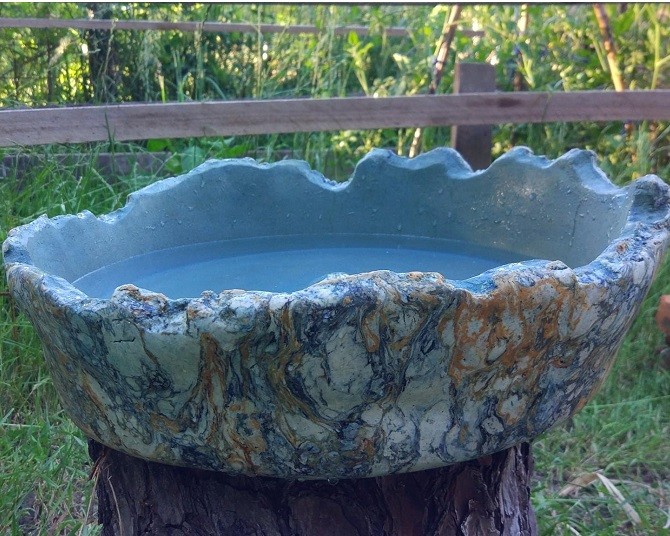
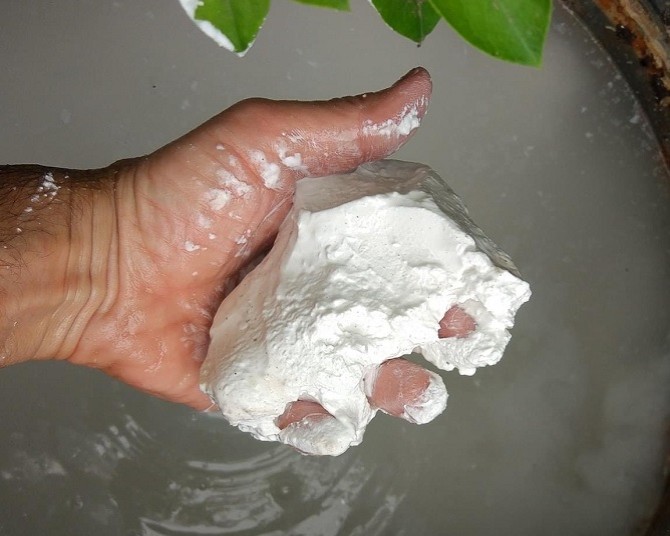
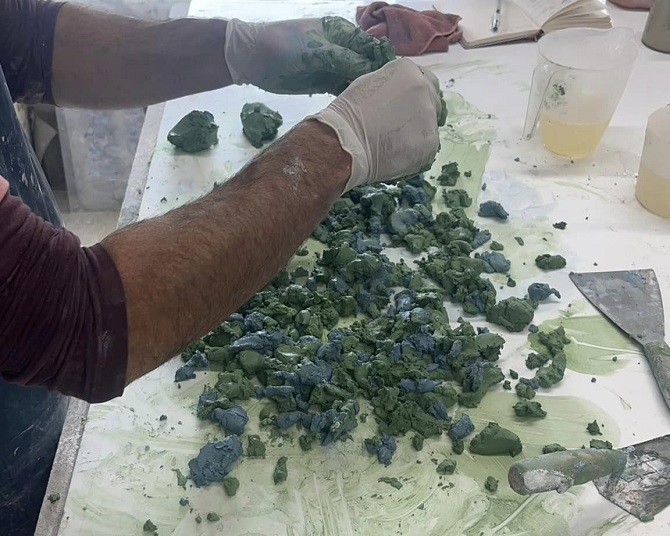
Introduction
International Master Artisan Oscar Urruela Sacristán
In this unique architeture workshop Spanish Master Artisan Oscar Sacristán will be teaching the Italian heritage faux marble Scagliola plaster on panels, on the wall and or as a sculptural art medium. A gypsum based plaster combined with animal glue and natural pigments to create veined finishes with the appearance of streaked marble. Scagliola is traditionally a fine finish reserved for the adornment of elite properties across Europe. However this is something Oscar is challenging by teaching these traditional techniques through a series of workshops he is hoping to make the technique accessible to all.
To attend this architectural workshop no previous knowledge of stucco (plastering) techniques is necessary, only an interest and desire to learn one of the most wonderful decorative techniques that exist and is now being updated.
Introduction to Scagliola Plaster
Oscar Urruela Sacristán
Why do we think that marble or scagliola stucco (plaster) can only decorate institutional buildings and those of the upper bourgeoisie?
Let’s change this erroneous idea and look further, let’s think of it as a technique that allows us to produce or create our own “fake” exotic marbles and granites from distant lands, stones that do not exist in nature and cover our walls with them, using them as a support other sustainable materials such as lime, mud or the plaster itself.
During this Scagliola workshop we will see how a classic technique that decorates the most emblematic buildings throughout not only Europe, but half the world, offers us the possibility of adapting it and ourselves to contemporary architectural trends.
Starting from accessible, abundant and cheap materials such as gypsum plaster, earth pigments and metal oxides, glue of animal origin (anyone can make it at home by making bone broth) and water, all of them 100% sustainable and with a low ecological footprint.
This technique allows us (having certain knowledge that is acquired in the introductory course and a certain creativity, essential in any craftsman or artist who is not an applicator) to carry out an infinite number of finishes. The only limitation being the creativity of each individual.
Knowledge of the different compositional and application techniques will allow us to work flat and in volume on different supports with good mechanical grip, coating walls, columns, stands, fireplaces, furniture, etc. with very high-level decorative finishes.
The marble stucco is worked on the tables with our bare hands where the different veins and colours are composed, giving shape to the jaspers, imitating natural granites and marbles, or creating shapes and colours that do not exist in nature and then transfer them to the support, where it is applied also with hands. From this moment on, we can shape as if it were clay, creating volumes and dimensions as we please.
The next and most satisfying process will be to bring to light what we have created by polishing the surface with water and natural stones or abrasives until the desired finish is achieved.
The entire creative process will take place wet, from when we work the different mass and colour consistencies on the tables until we finish filling the pores and polishing with the finest pass, this permanent wet work will give the marble stucco a resistance to water and unthinkable hardness in a plaster.
To finish, once several days have elapsed since the complete loss of moisture and when the plaster glass has acquired its final hardness, we will finish the surface by polishing it with an emulsion of beeswax and carnauba or a natural oil.
Meet The Master Craftsman
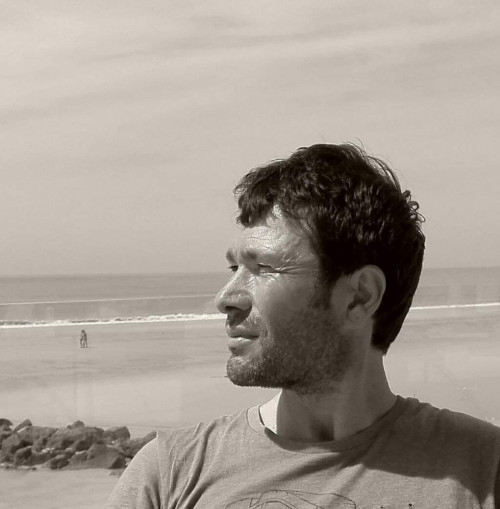
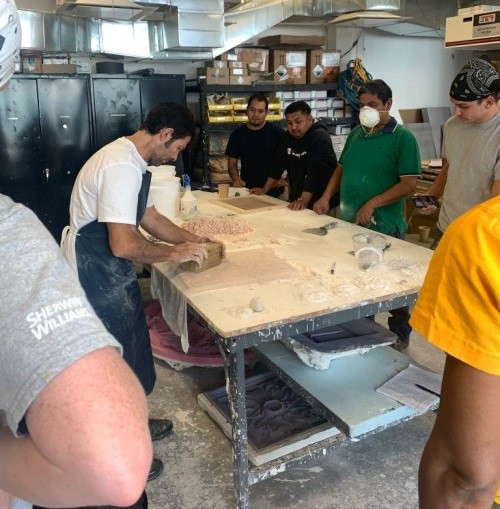
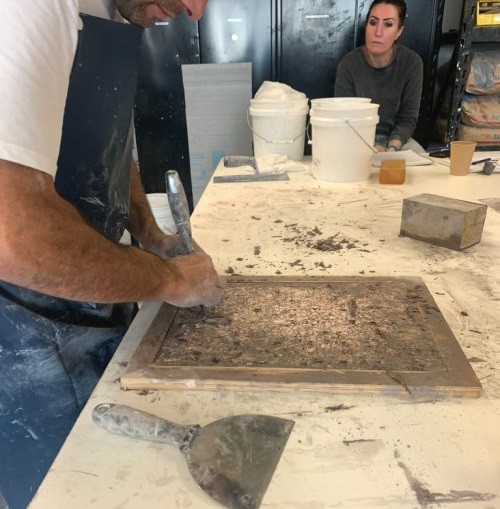
Oscar Urruela belongs to the third generation of stucco masters. He learned the trade from his father in the workshop and on site, developing with him a multitude of new and restoration jobs, especially in the north of Spain.
He has worked in hotels, theatres, institutional buildings, commercial premises and private homes. Using techniques such as scagliola, lime stucco, plaster stucco, stone restoration etc. He has a deep understanding of traditional materials and techniques, which allows him to also experiment with new textures and colours.
After the retirement of his teacher, he has begun a new stage in which he combines his need for experimentation and exploration with different natural and traditional materials in the search for new application techniques. With the continuity of work on site, undergoing a transmutation towards a more contemporary vision of the finishes.
He has also begun a creative phase researching in the fields of art and sculpture using the experience in different techniques and materials acquired over the years. Oscar participates in both collective and solo art exhibitions in different European cities and countries.
Since 2010 and always with the premise of enhancing and transmitting knowledge of our wonderful and forgotten traditional decorative techniques, he has been dedicated to teaching. The highy speialised techniqe is a refeeshing oprion for an architectural workshop, and is being received with great enthusiasm in Spain and other countries such as the USA, Argentina, Uruguay, England & Japan.
His architectural workshop series offer different techniques, levels of difficulty, specialisation and duration. Scagliola, fire-ironed stucco, lime stucco, lime and plaster stucco (work), classic scagliola, artistic pieces, continuous natural floors, contemporary murals…
In 2020, and after several years of research and development, he also began to manufacture and market a range of traditional products in an artisanal way, developed with local raw mineral materials with a low ecological footprint and with different applications, both indoors and outdoors, based on lime and plaster (trabadillos ) with the trade name of GeBat System.
Oscar also collaborates in the creation of artistic projects for museums and contemporary artists with international companies such as Factum-arte, Empty and Acciona in museums in Qatar, Dubai, Oman, Algeria.
Workshop Content
- Hands on small group architectural workshop
- Participants will learn to apply what they have learned to different work contexts – decoration, restoration, sculptural art
- Sessions will follow a trial-error system that will provide us with adequate resources in the event of any setback. Learning by doing will give a deeper understanding of the materials and why they respond in the way they do and how to meet any challenges they may present.
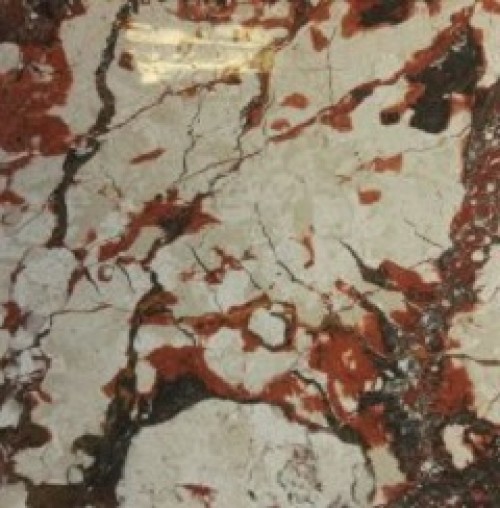
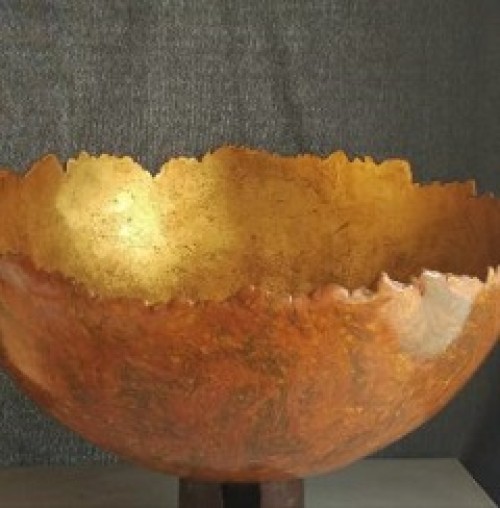
Theoretical Sessions
- General presentation of Marble stucco (plasters)
- Definition of stuccos.
- Stucco in the history of art.
- Function of marble stucco.
- Advantages and limitations.
- Graphic documentation.
Practical Sessions
- We will begin with a demonstration on a table.
- Collection of materials and tools.
- Job layout.
- Presentation of materials.
- Preparation of mother glue and setting, tasting.
- Setting control by varying the proportions of pigments.
- Dough consistencies.
- Making samples in two colours. Your choice.
- Simple marbling techniques.
- Evolution in the complexity of the compositions.
- Formation of doughs, balls or breads with their streaks or other adjectives in gaps.
- Flatness techniques.
- Plastering-polishing-drying times.
- Finishes.
- Reconstruction of the veining and structure of a marble sample.
In the course we will practice several samples using different composition techniques and different decorative styles.
Inclusions & Cost
₹25500 – Workshop Fees
- Includes participation in a small group hands on workshop maximum 20 participants.
- Ample opportunity to interact with Master Artisan one on one for personal guidance in technique.
- All materials
- One frame to practice the technique in, allowing you take the sample home.
- Practical & Theory sessions taught by a highly skilled internationally renowned Master Artisan.
- All materials
- Vegetarian lunch & morning & afternoon tea
Location & Host
Dr Abrol – Kalakshetra Aravindam – Panchgaon Village – Delhi
Kalakshetram Aravindum is a peaceful garden oasis sprawled over a few acres. Located just 40 minutes from Gurgaon, yet it feels a million miles away.
Dr Lokesh Abrol is an MD by profession and a philanthropist by heart. He shares our passion for the conservation of precious cultural heritage. That passion is what inspired him to establish a gurukul to teach underprivileged children heritage arts. He currently has around 200 children, mostly girls studying Bharatnatyam & Kathak dance, Kalaripayattu martial art, Geeta Vachan, Indian Classical vocals & Madhubani painting. The gurukul is located in Gurgaon, however Dr Abrol has also created a calm, green botanical oasis – Kalakshetram Aravindum around 1/2 an hour from the gurukul which is used for hosting workshops and performances of the children.
Set over a couple of acres this garden oasis will be the site for the workshop. We are excited to be adding lime finishes to this special place and your participation in the workshop is making it all possible.
To learn more about the Gurukul visit https://aravindam.org/
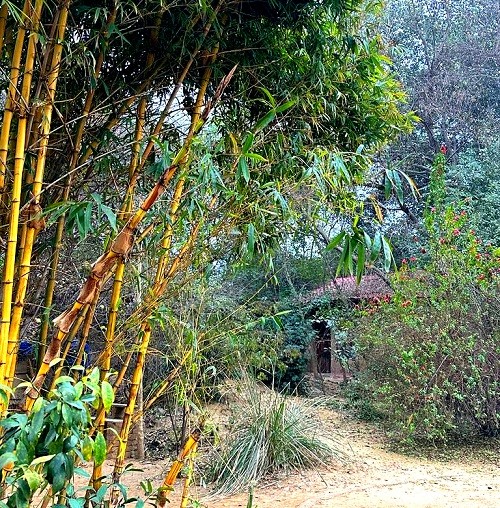
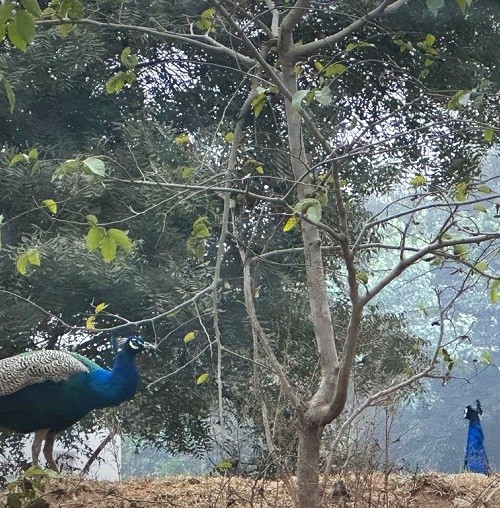
What to Bring
- Refillable water bottle
- Sunscreen & hat
- Moisturiser – Working with lime can dry your hands.
- Work gloves – you may wish to bring surgical gloves for use with lime. If you require something more heavy duty consider rubber coated garden / construction gloves
- Light weight comfortable clothing that you don’t mind getting dirty
Accommodation
Accommodation is not included in the workshop fees. There are numerous options for stay nearby. Hotels are available in Manesar, and paying guest houses in Panchgaon. Detailed options will be provided closer to the date.
